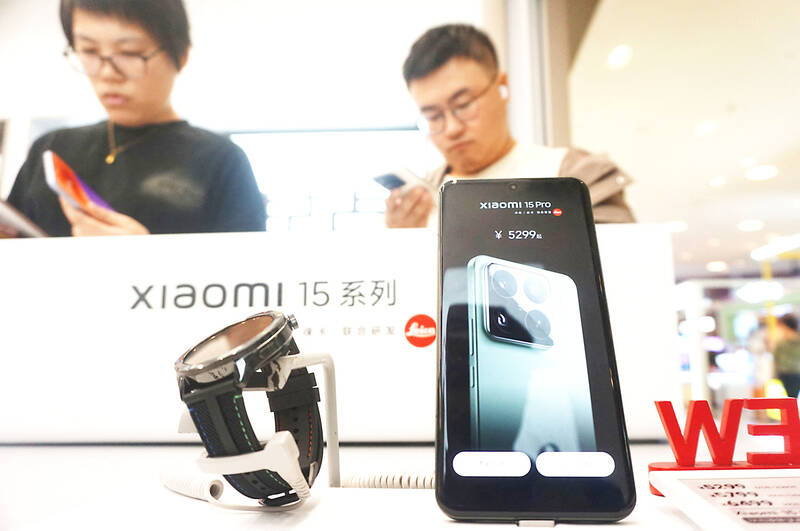Xiaomi Corp (小米) is preparing a self-designed mobile processor for its upcoming smartphones in an effort to reduce its reliance on foreign suppliers Qualcomm Inc and MediaTek Inc (聯發科).
The processor might help Xiaomi be more self-sufficient and stand out in an Android market led by Qualcomm customers.
Mass production of the chip designed in-house is expected to begin next year, people familiar with the matter said.

Photo: AFP
The timeframe underscores how Xiaomi is keen to join a growing number of tech majors investing in semiconductors, a key focus for Beijing in a broader tech race with the US.
For the Beijing-based company, it marks a foray into yet another cutting-edge field in a year in which Xiaomi also invested heavily in electric vehicles (EVs).
Developing in-house chipmaking expertise can help the company’s efforts toward making smarter and better-connected EVs, above and beyond more competitive mobile devices.
A Xiaomi spokesperson did not respond to requests for comment.
Xiaomi’s nascent semiconductor work could pose a challenge for the chip manufacturer it contracts this production to, as industry leader Taiwan Semiconductor Manufacturing Co (台積電) faces escalating pressure from US authorities to curtail its business with customers from China.
The Chinese smartphone maker, which counts Qualcomm as an early investor, works closely with its US partner, and has generally been content to optimize the main processor and augment it with power management and graphics enhancements.
Xiaomi will invest about 30 billion yuan (US$4.1 billion) in research and development next year, up from 24 billion yuan this year, chairman and chief executive officer Lei Jun (雷軍) said last month.
The research will focus on core technologies such as artificial intelligence, operating system improvements and chips, Lei said.

In Italy’s storied gold-making hubs, jewelers are reworking their designs to trim gold content as they race to blunt the effect of record prices and appeal to shoppers watching their budgets. Gold prices hit a record high on Thursday, surging near US$5,600 an ounce, more than double a year ago as geopolitical concerns and jitters over trade pushed investors toward the safe-haven asset. The rally is putting undue pressure on small artisans as they face mounting demands from customers, including international brands, to produce cheaper items, from signature pieces to wedding rings, according to interviews with four independent jewelers in Italy’s main

Japanese Prime Minister Sanae Takaichi has talked up the benefits of a weaker yen in a campaign speech, adopting a tone at odds with her finance ministry, which has refused to rule out any options to counter excessive foreign exchange volatility. Takaichi later softened her stance, saying she did not have a preference for the yen’s direction. “People say the weak yen is bad right now, but for export industries, it’s a major opportunity,” Takaichi said on Saturday at a rally for Liberal Democratic Party candidate Daishiro Yamagiwa in Kanagawa Prefecture ahead of a snap election on Sunday. “Whether it’s selling food or

CONCERNS: Tech companies investing in AI businesses that purchase their products have raised questions among investors that they are artificially propping up demand Nvidia Corp chief executive officer Jensen Huang (黃仁勳) on Saturday said that the company would be participating in OpenAI’s latest funding round, describing it as potentially “the largest investment we’ve ever made.” “We will invest a great deal of money,” Huang told reporters while visiting Taipei. “I believe in OpenAI. The work that they do is incredible. They’re one of the most consequential companies of our time.” Huang did not say exactly how much Nvidia might contribute, but described the investment as “huge.” “Let Sam announce how much he’s going to raise — it’s for him to decide,” Huang said, referring to OpenAI

The global server market is expected to grow 12.8 percent annually this year, with artificial intelligence (AI) servers projected to account for 16.5 percent, driven by continued investment in AI infrastructure by major cloud service providers (CSPs), market researcher TrendForce Corp (集邦科技) said yesterday. Global AI server shipments this year are expected to increase 28 percent year-on-year to more than 2.7 million units, driven by sustained demand from CSPs and government sovereign cloud projects, TrendForce analyst Frank Kung (龔明德) told the Taipei Times. Demand for GPU-based AI servers, including Nvidia Corp’s GB and Vera Rubin rack systems, is expected to remain high,